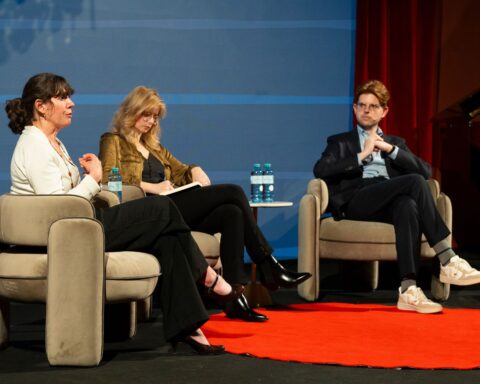Harry Potter is dead. So begins the summary of one of the most noteworthy pieces of fanfiction to ever grace the internet. Tolstoiesque in length and Proustian in approach, Manacled by SenLinYu explores the aftermath of Voldemort winning the Second Wizarding War. With over two million views and translations available in 11 languages, the story is only one of approximately 350K+ written about the Harry Potter universe, available for free on the nonprofit platform Archive of Our Own.
A divergent story? Written by a fan? Posted on the internet? Archive of what? you may ask, and you would not be the only one.
Over the last few years, as fandoms and fanworks – fanfiction amongst the most favored – have continued to gain in popularity, the interest in the phenomena, as well as the number of questions about their origin and meaning, have also increased dramatically. So let’s back up a little.
Fandom is the collective experience of fans, mainly women and genderqueer individuals, who build things together, support each other, and learn from each other. Fandom is making every one of us sharper, smarter, more talented, more deeply creative, more subversive, and more politically and culturally aware, with every moment we’re in it.
Aja Romano for Vox, 2016.
Fandoms, fanfiction, fanwork: an introduction
If you’ve been on the internet for any amount of time, chances are that you’ve come across at least one of these terms before. At their very basic, the definitions are simple.
Fandoms are communities of fans formed around specific objects of interest, either on- or offline, with various degrees of involvement. According to Vox, which has dedicated an entire series to better understanding fan culture, the term was first been printed in 1896 by the Washington Post, as part of a sports column.
Fanfiction is a result of the collaborative creative process that is a core part of the fandom experience. As the name would suggest, it refers to fiction that uses a previously existing work as source material. Similar types of content (fanworks) include fan art and fanvids (visual interpretations), fan comics, cosplay, and many others. The ever-evolving digital space plays a vital role in challenging and constantly expanding these definitions.
One cannot speak of fandom without also mentioning one of its most beloved (and fun) activities: shipping. Shipping refers to the act of rooting for two or more characters to become romantically or sexually involved. The term has been coined by the X-Files fandom back in the 90s to refer to protagonists Mulder and Scully. What’s more, even before shipping was ever considered a thing, it was a core pillar in what many see as the first modern version of fanfiction.
The Beginnings
In the 1960s, decades before platforms such as Tumblr and Wattpad helped bring stories written by fans into the mainstream, the Star Trek fan community published “fanzines”, which contained interpretative works based on the original universe. Many of them focused on Spock and Kirk as the main romantic pair, thus also contributing to the beginnings of slash fanfiction, a subgenre in which two or more characters, who are usually presented as heterosexual in canon (the original, source material) engage in same-sex relationships.
However, while the Star Trek zines could be seen as the beginning of modern fanfiction, the concept itself existed long before it was ever given a name. Many argue that the true origins lie centuries ago, as the art of reusing content has been at the cornerstone of literary development throughout history.
Some critics go as far as to call various classic works fanfiction. Shakespeare’s plays were almost all sourced from earlier forms of literature, just as the Homeric epics originated from a tradition of non-canonical oral interpretation.
“Without fanfiction, would we have movies such as Clueless or West Side Story? Without fanfiction, there would be no Wide Sargasso Sea or The Hours. Fanfiction is simply another aspect of literature, an institution that can train readers to become writers.” writes Vanessa Willoughby for Book Riot.
On The Rise
Regardless of its murky beginnings, fanfiction grew in popularity as the rise of the World Wide Web in the 1990s allowed fans to start creating websites on which they could host their works.
Platforms such as FanFiction.net, LiveJournal, or Archive of Our Own are loved by users around the world who wish to share their writing, and they’re continuously evolving, as digital advancement creates space for further innovation.
In 2014, Wattpad was already reporting that 53% of its users have written a fic on their phone, through their mobile app, and more than 70 million stories were uploaded onto the site by September of that year.
As of 2021, Archive of Our Own, or AO3, featured more than six million archived works and counted over two million users. A true pioneer, AO3, which launched in 2009, is still fully independent, run by fans and volunteers in a beta version, accepting donations to improve the platform’s functionality. The website, which functions under the premise that “fanworks are transformative and that transformative works are legitimate” went so far as to win a Hugo Award in 2019, a resounding win that speaks of its value and cultural significance.
Furthermore, a prime example of the growing relevance of fanfiction, even outside of the fandom sphere, is none other than the pop culture phenomenon 50 Shades of Grey, which, although widely criticized, has amassed millions of fans. Originally a fic called Master of The Universe, the series was written by E.L. James as a Twilight story and was self-published through a small former writers’ community.
Reshaping Art & Culture
It is no wonder that, as technological advancement makes it easier for fans to connect and share their work, as well as easier for new stories to gain popularity, the topic has landed at the center of many public debates in recent years.
Beyond it being a creative outlet and a form of art in and of itself, fanfiction speaks of how we consume and analyze culture, how we produce and reproduce meaning through the media around us.
Plagiarism versus transformation
A central aspect in the fanfiction discourse, which continues to spur dispute, is the matter of its originality, as well as the implications that stem from using known source material.
From a legal perspective, fanwork is regarded as questionable at best and downright illegal at worst, with the US being one of the first countries to pioneer its fair use status. Groups such as the Organization for Transformative Works or the Electronic Frontiers Foundation have spent years fighting for the acceptance and protection of fanworks. Both fans and creators share the opinion that copyright law is severely outdated and in desperate need of revision.
It is, however, the moral conundrum that also seems to divide writers and readers alike. Is it right to use existing characters, entire worlds really, to build up your own story? What constitutes right in a field where lines are generally so blurred?
Several authors, such as Diana Gabaldon and Robin Hobb see fanfiction as insulting, illegal and immoral. At the beginning of the 2000s, Anne Rice had gone so far as to forbid fanfiction based on her Interview with a Vampire novel, and pursued legal action against many users that dared to publish. Others, such as Good Omens author Neil Gaiman or three-times Hugo Award-winner N.K. Jemisin, not only support it, but engage in writing fanfiction themselves.
Fighting for legitimacy
Supporters have spent years advocating for fanfiction, explaining that, in essence, the practice is about so much more than borrowing characters or certain world-building elements. Where plagiarism copies and steals, fanfiction aims to expand. To breathe new life into the source material, oftentimes making it richer and more complex than before. As it’s been argued time and time again, fanfiction is not a rip-off, but a transformation, which stands on centuries of telling and retelling stories, of recursive literature and remix culture.
Fanworks are largely not-for-profit, with artists and writers making it clear that their only goal is to engage with the original work in a way that is meaningful to them. For many, it’s a tribute. If plagiarism and those who partake in it are all about taking advantage, fanfiction and its writers stand as proof of a work’s significance and value, of what happens when you allow yourself to be so deeply inspired by the source material. The many beautiful, compelling stories that have resulted from it speak for themselves.
“Fandom is reading fiction so good, not just good but soul-activatingly amazing, that when you’re done you instantly feel sad because you can’t have the experience of reading it again for the first time. Fandom is having that experience often, because fanfiction is very often just that good, just that brilliant, just that subversive or canny or hot or emotional or funny or perfect as any other fictional work.” writes Aja Romano for Vox.
Representation and inclusion
It is exactly because of its transformative characteristics that fanfiction has become so relevant in today’s context. By nature, through the fact that it enables fans to add new layers of meaning to an existing work, it allows room for complexities that aren’t part of mainstream representations. Where today’s media fails to deliver, fanfiction fills in the blanks.
While many complain about the prevalence of slash fanfiction, or of gender– and race-bent interpretations, it is things like these that point towards what we so sorely still lack: stories that different people can see themselves in, that speak of and to their experiences.
Fanfiction might be overlooked and dismissed as lowbrow culture, but in many ways, it answers a need that is so often ignored by the elite. To this day, many stories fail to reflect the perspectives and experiences of too many fans – LGBTQ+ individuals, people of color, as well as individuals with any kind of disability are rarely at the center of the narratives we are exposed to. Fanfiction creates a space to change that, to challenge assumptions of whiteness or heteronormativity. It allows marginalized groups to rewrite the script and produce media that is inclusive of their identities in ways that aren’t stereotypical or fetishizing.
In the words of Jenny Yau, fanfiction allows people to explore different narratives, while at the same time exploring themselves, providing a safe space for those who are normally marginalized.
On fanfiction’s stage, people of color are the main characters, LGBT couples dominate the platform, identities like aromantic and asexual are no longer invisible, and bisexuality is no longer erased, finally allowing audiences who aren’t seen in mainstream media to see themselves reflected in the media they consume and create.
A space for new perspectives
It comes then as no surprise that the data on those who write fanfiction is very telling. A census on the user demographics of AO3, conducted by Tumblr user centrumlumina in 2013, revealed that 80% of the respondents identified as female, 6% as genderqueer, 2% as transgender and 2% as non-binary. Furthermore, only 29% identified as heterosexual.
While it has long been accepted that the fanfic world is widely female, the 2013 data, which we have reason to believe has remained pretty consistent in the almost ten years since, speaks volumes about the population segments who choose to engage in transformative fandom, and why. When it comes to dominant cultural narratives, it can often feel as though there isn’t space for diversity – in fandom, by design, there’s space for all.
Considering the above, it is not surprising that the general dislike of fanfiction has been linked to a longstanding tradition of dismissing the desires and perspectives of women or LGBTQ+ individuals. The attitude is but a symptom of a larger societal issue, of the need to denigrate anything associated with the interests of females.
Historically, media that is interesting to young women has always been dismissed. In many cases, respect for a piece of content is contingent on its value in the eyes of the cultural elite, largely consisting of white men in positions of power.
Young women are so attacked for loving the media they love that it is a radical act for a young woman to love something unashamedly. And transformative fandom is the most radical act of all, because it reverses that “lady thing to respectable thing” process. It takes a piece of media that may not have been designed for young women and makes it for young women.
Constance Grady for Vox

A space for community and learning
Beyond enabling fans to find a creative outlet, fandoms and fanfiction in particular go one step further. They allow people to find each other, to organize in communities that show them the understanding and support they might not otherwise find.
Many who believe that engaging with fanfiction is simply about the act of telling a story about characters that already exist, would be surprised to find that there is an entire world where fanfic community members form bonds based on support and encouragement.
Responding to these needs, fanfiction platforms are constantly evolving to maintain a space that is dynamic and safe for experimentation. On websites such as AO3, fans meet others who share not only the same interests but also the same struggles. They help each other find a voice through writing, by using the familiarity of a known universe to explore their identities.
What’s more, fanfic turns the process of producing and distributing art inside out, showing just how relevant the communal creative effort is. Without the interaction or community, many authors admit they would not have gotten as far or created as much as they did. Renowned fantasy author N.K. Jemisin credits fanfiction with teaching her to write with an audience in mind, likening the experience to that of a giant writing workshop, similar to what happens in college creative writing classes.
Through it all, published and fanfic authors around the world agree: there is power in creating space for those who don’t usually see themselves in mainstream media. In teaching and allowing people to create on their own terms, in a supportive environment. In spite of the controversy, fanfiction – as a creative practice, as an outcome, as a concept, remains one of the most culturally relevant content forms produced nowadays.
Looking into the future
The discussions around fanfic are and will continue to be endlessly varied, especially as the phenomenon garners more public attention. With technologies, as well as legal and sociological perspectives evolving at a rapid pace, so do the debates about its legitimacy.
However, if there is one thing that cannot be denied, that is the significance and enormous potential of fanfiction to further develop in ways that can help those who choose to engage with it.
Katie Davis and Cecilia Aragon, professors at the University of Washington, posit that the kinds of communal, positive learning spaces opened up by fanfiction can be akin to what some would call distributed mentorship, and further point towards their relevance for teaching.
What’s more, an increasing number of scholars highlight the ways in which fanfiction can support one in learning a foreign language. Students who struggle tend to be more enthusiastic and perform better when one-page essays are replaced with writing and reading fanfics, claims Rebecca Black, professor at UC Irvine.
Many people who have been part of fandoms, both during their developmental years and later on, credit abilities such as coding, UX design, or video editing to them creating and sharing transformative fanworks.
Some have gained hard skills, many have gone on to become published authors. Others have come out the other side with an online family that supports and accepts them in their creative pursuits.
Whatever the role that people will attribute to fanfiction in years to come, one can only assume that it will continue to break through the limitations of the mainstream, offering writers and readers alike a chance to find their voice, their passion, their community, just as it did until now.
Header photo by Hatice Yardım on Unsplash.
Reviewed by Leen De Marez
Proofread by Julia Zmölnig





